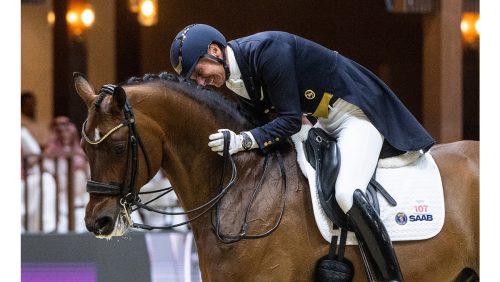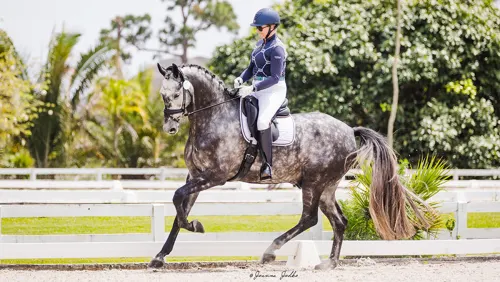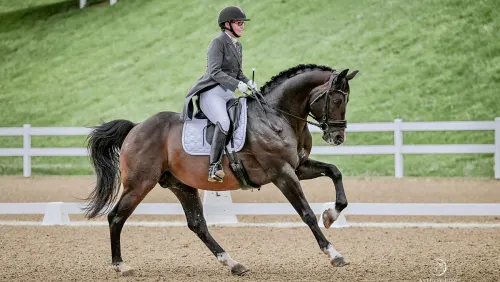Our columnist challenges us to recommit to substantive involvement in the sport instead of being reactive—and uninformed—on social media.
With every new year it seems we decide this will be the year of change. New Year’s resolutions run rampant through our minds and bodies. We get new gym memberships, go on new diets, think of ways to revolutionize our lives, save money, work better, and so on.
When I look back at 2015 I think about which resolutions for the sport of dressage came to fruition. What great ideas were we tossing around back in the early days of 2015 that never saw the light of day, and which ones have become rules or ideas that are now governing our relationship with the sport?
The years before a major international championship tend to be relatively quiet, as most top riders and their federation officials are busy planning and preparing for the following year, so the “off year” seems to go by without much fanfare. Still, 2015 was important in that the Pan American Games gold-medal showing secured U.S. dressage its Olympic start for 2016.
Notable Moments From 2015
On a global scale, we had a few good things and a few bad things. The European Championships in Aachen, Germany, brought us a lame Totilas, who was obviously unfit to be competing and created quite a stir. We also saw Dutch superstar Edward Gal eliminated at those European Championships because of blood in his horse’s mouth in the Grand Prix Special, and we saw Steffen Peters quietly eliminated from the Reem Acra FEI World Cup in Las Vegas for blood on his horse’s side—all three of which had press releases out to the general public within moments of the events to help calm and subdue skeptics and rally well-wishers alike.
In 2015 we did not see the return of Isabell Werth’s Bella Rose to competition for Germany, but Werth did start yet another horse, Emilio, into a Grand Prix career.
The Dutch team seems to be in a continual state of flux, and it’s always fun to see what new star will arise from there. We saw the return and very quick withdrawal of Adelinde Cornelissen’s Parzival for the Dutch. We missed Helen Langehanenburg’s Damon Hill, who has left the German team to become a schoolmaster for an up-and-coming young rider.
Great Britain’s Valegro and Charlotte Dujardin continued to dominate with no major threats to their supremacy.
We saw Andreas Helgstrand in trouble yet again for being too tough on horses in warm-ups, which in part resulted in videoed warm-up arenas at larger shows in Denmark to help police rider action. Back at home, Tina Konyot was given an FEI yellow card for “incorrect behavior” at the Adequan/FEI North American Junior and Young Rider Championships (Ky.).
We saw Laura Graves best Peters at our somewhat anticlimactic (due to timing) national championships held in December in Wellington, Fla., in front of a less than packed house.
In 2015 we got to witness the return of Michael Poulin to the Grand Prix arena with a win at the U.S. Dressage Finals, and we saw the continued rise of an upcoming star, Allison Brock on Fritz and Claudine Kundrun’s Rosevelt, whom Brock has trained from the ground up.
The main topic of the USDF Convention this year seemed to be the rotation or non-rotation of the U.S. Dressage Finals. The discussion on what it will take to get—and keep—America on top internationally continues to truck along, as does the debate over how to educate and identify talented young riders and grow the base of the sport.
We’ve seen implementation of one of the most ridiculous rules to face international dressage in regard to elimination based on a second course error and a 2 percent penalty on your first. The FEI has put together a “working group” to review the dressage training methods and warm-up protocol for stewards at horse shows, but why has this taken so long?
ADVERTISEMENT
Be The Wheels Of Change
So what are this year’s resolutions for ourselves and our sport? Looking into 2016, what changes would you like to make, and how would you make them?
When I think about the resolutions I’ve made for my own riding I feel pretty good about them, although I, like many other people, could still act far more on the words I speak. Over the last few years one of the resolutions I’ve made has been to be quietly more outspoken about what I believe in. I think it is our duty to do so: to talk and to be the wheels of change that turn the sport.
This fall, my friend Paul passed along a book called “Modern Romance” by Aziz Ansari. He wrote about how much the Internet and cell phones have revolutionized the dating scene, creating an evolution of dating that no one could have imagined even 15 years ago, and it rang very true to the world of dressage as well. The Internet and the cell phone have done much the same for horse sports, as within moments of a ride, a press release, a video, a condemnation, a glowing report or the like can be posted for the world to see without edit or thought.
We could all see the videos of Totilas’ ill-fated test in Aachen or Legolas’ elimination from the World Cup almost in real time and judge for ourselves the action the officials, coaches, team leaders, riders and spokespeople took. Technology has made the world a much smaller place.
We are streaming, uploading, downloading, texting and posting information faster than most of us can actually watch or read. As soon as one thing happens, we’re already moving on to the next as we have the information and footage as soon as it happens. I sometimes wonder, however, if in the speed of information delivery, is some of the impact of the information being lost?
Back when you had to wait weeks or months to see a video, read the article or note the press release, the discussion would continue until that information was delivered, and even then, the discussion continued for weeks to come because there were no bulletin boards to talk on, texts to send, or websites to visit. People would wait days, weeks or months for a magazine or video to come out so they could study what happened and then discuss or watch it with friends. At that time you were so hungry for the limited information you could get, you read it, viewed it and studied it over and over.
I wonder as well if the rides, tests, trainings and warm-ups are getting videoed and posted in real time, as the discussions on the Internet or over the phone happen equally as fast, are we taking the time to listen and absorb what is actually happening? Do we read anymore or just watch? Are we just waiting for our turn to talk about what we think happened, or are we listening to the experts or people involved to be better informed?
I’ve done a few short videos for a website called dressagehub.com over the last year and noted to the owner one day the number of shares a few of the videos had. She reminded me it wasn’t the shares that were important; it was the views. One had been shared nearly 3,000 times but only viewed about 1,000. Is the information being absorbed or just passed on, and is it more important to be viewed by your peers as a source of information rather than an informed source?
The trend of sharing without reading or watching is a strange one. The same seems to happen when a crisis or challenge arises in the sport; as soon as we hear about it, we “repost” the information without reading or watching and then move on to the next turning point.
Why is it a rider like Helgstrand can be in “the hot seat” so many times over the last few years in regard to questionable handling of his horses, yet each time it happens seems to be the first? Do we choose to ignore it, or do we not remember it has already happened because we only glanced over it, reposted it and moved on?
Are you a victim of dressage amnesia? Are we following through on media coverage, or is it in one ear and out the other?
In 2015 I read countless quotes or statements made by various top-level riders and was astonished by how few people had actually heard or noticed something was said or done. Do people, especially the younger generation, the future owners of the sport, the Generation Y or millennials, actually read anymore?
There was an op-ed in Horse & Hound where Carl Hester questioned the FEI’s rule, article 401, that the poll of the horse must be the highest point. I’ve only found a few people who have read it. Many had reposted it on Facebook, but no one really had an opinion about it. No one seemed to want to challenge Hester, and no one seemed to have absorbed what he was saying. Agree or don’t with his comments, we should at least have an opinion and be listening when a trainer in his position is speaking to such a large audience.
ADVERTISEMENT
Christian Carde wrote a counter piece to Hester’s column, which was published on Eurodressage.com, but it also seemed to go without major notice, although there were a lot of reposts of it on social media.
Hester had another quote that seemed to go without much notice in 2015, though it should have been heard around the world like a crack of thunder from the heavens. In commenting on the FEI’s proposed 2 percent penalty and then elimination for the first and second error of course, he is quoted as saying, “Does anyone on the dressage committee really care about the sport?”
Things like these should be the subjects of press releases, the kinds of things people should be rallying around, not whether or not someone did or didn’t have blood on their horse’s side. A comment like Hester’s is history in the making.
Why do we care more about who got eliminated from a World Cup than we do the future of the sport? Why do we dwell so much on the past, instead of looking to the future? Why can one of the world’s leading riders and trainers make comments regarding our future, and they seemingly go unnoticed by the masses?
We should be listening to what these people are saying. Instead of top riders, trainers and federations sending out press releases and Facebook posts defending their riders or mistakes that have been made, send out Facebook posts or press releases condemning the FEI for making such bad decisions and guiding our sport in such poor ways. Why are riders and trainers always willing to protect their butts, but never wanting to put their necks on the line?
Kudos to Hester for speaking his mind on any matter; at least we know he is paying attention and cares. More people in positions like his should follow his lead. You don’t have to always be right; you just have to be educated and care. For that fact alone, Hester became a hero of mine in 2015. His training, riding or production of Valegro and Charlotte Dujardin is nothing in comparison to his willingness to be outspoken about what he believes in.
When people like Carde and Hester have a disagreement, listen to the discussion. They are both great horsemen of our time and helping change the future of the sport.
New Year’s Resolutions
With the 2016 Olympic Games right around the corner, the FEI continues to talk about what to do with dressage in order to keep it in the Games. A dressage berth is slated for the 2020 Tokyo Olympics, but what about after that?
I wonder what new tricks and ploys the FEI and its constituents are going to throw out there this year or in the following years to make it more viable to the public. What ideas do they have up their sleeves, and will we all go along with it? Will only a few select individuals speak out for or against decisions? Will the press releases and factions continue to come alive only when the ethics of one of their rider heroes is called into question?
Some of the resolutions I would love to see the dressage community make for 2016 include: Get up and take notice, read more, follow the rulebook, absorb, study, act instead of talk, stand up for what you believe in, take sides, think about your impact on the whole, be aware, talk less about your greatness and more about others.
What would be yours? When you see an incorrect pirouette, don’t just love it because it’s a medal winning horse. If you see a horse piaffing croup high with a short neck and low poll, contradicting the rules, boo instead of cheer. If you disagree with a new rule, speak up and don’t just succumb to its law. If someone is behaving poorly in the warm-up on or off a horse, even a national hero, call the steward over. Worry less about being politically correct and more about the future of our sport. Listen to the disagreements and to the discussions and become educated instead of just proclaiming your own beliefs. We are the future of our sport, and it is up to us to continue to be the police to the FEI, not the other way around.
Let’s make 2016 a year that changed the sport.
Jeremy Steinberg was the U.S. Equestrian Federation Youth Coach from 2010-2014. He’s a well-known rider, trainer and competitor based out of Del Mar, Calif. He’s also a selector for the Developing Horse Program and one of five clinicians who works with the U.S. Dressage Federation in its Platinum Performance/USDF junior and young rider clinic series. He worked with longtime friend and mentor Dietrich von Hopffgarten extensively until his passing in 2004. Jeremy has trained and shown through the Grand Prix level. He now runs a small “boutique”-type training business and travels the country giving clinics. More information can be found at steinbergdressage.com.














